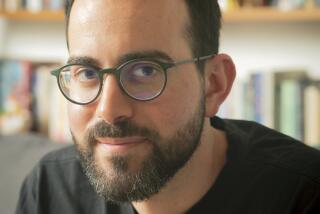During 7-Year Job Search, PhD Turns Intellect to Humorous Ends
- Share via
He got his bachelor’s degree in government at a college in Claremont and his advanced degrees in political science at a university in Chicago.
But Philip J. Frankenfeld earned his do-it-yourself degree in deconstruction at his mom and dad’s house in Long Beach.
That is where the 39-year-old moved after earning his doctorate and then spending seven years writing job resumes. And writing a nonstop series of spoofs about life in Los Angeles using what is known as the deconstructive style of criticism.
Thousands of job applications and one-liners later, the man dubbed by one national organization as a “poster child for the PhD glut” has finally found employment.
He leaves today to work for a Washington research firm where he will study the future of the automobile in American transportation.
Not bad for someone who doesn’t have a car: As an unemployed intellectual, he could never afford one.
And not bad for someone who had almost decided that there was no future for him in a society where the highly educated keep multiplying while the job market keeps dividing.
“I’ve been all wised up with no place to go,” says Frankenfeld. “I’ve spent so much time at Kinko’s printing resumes that it reached the point I was taking phone calls there. I actually applied to Kinko’s for a job. . . . They turned me down too.”
Frankenfeld’s goal in the beginning was to find a college teaching position. He applied for positions at nearly 300 schools, routinely running up against as many as 800 other applicants.
As he waited to be summoned into some ivory tower somewhere, he struggled to keep his research and writing skills fresh. He ended up doing it in a wry way, not a dry way.
Instead of researching obscure topics to turn into obtuse articles for scholarly journals, Frankenfeld regularly perused newspapers and magazines for subjects to poke fun at with humorous anagrams, doggerel and double-entendres.
He mailed them daily to educators and to magazines and newspapers around the country, hoping that his observations would pop up in stories or as letters to the editor.
They rarely did--although hundreds of submissions sent to National Public Radio prompted broadcasters to air a report on the self-described “unfunded pundit.” It was NPR that handed Frankenfeld the PhD “poster child” label.
The endless job search led to his embracing deconstruction.
Deconstruction is a 30-year-old form of literary interpretation that dissects the logic of language to reveal hidden, often opposite meanings in text. It is viewed by scholars as an important part of postmodernism, although Frankenfeld’s “deacon” designation is strictly self-administered.
George Burns was probably the first deconstructionist, Frankenfeld speculates. David Letterman is probably the best known recent one: “Letterman tells jokes about jokes,” Frankenfeld explained.
“Most full-time deconstructionists are in English programs that have run out of things to write about. A priest of deconstruction takes it seriously, never creating anything new--just analyzing. A deacon of deconstruction is someone who doesn’t use the jargon. I’ve never used the word ‘referentiation,’ for example.”
Frankenfeld printed his Deacon of Deconstruction title on his stationery letterhead, beneath an artist’s sketch that depicts him using a knife and fork to slice apart printed text.
Targets of his gentle jabs have ranged from the RAND Corp. think tank in Santa Monica and the high-IQ group Mensa to Internet valentines--”net stalkings,” as he put it.
Frankenfeld acknowledges that his unemployment--and his penchant for spending his days hunkered over his computer writing his spoofs--put an end to his own romantic intentions.
“I was engaged to a philosophy professor,” he explained. “She said, ‘You haven’t gotten a job. Please leave.’ She was upset that I was successful at being a dilettante.”
By the start of this year, Frankenfeld’s family was also starting to worry that he might never find work.
“My cousin was dragging me to mixers for people who have advanced degrees in hopes that might lead to a job. But those people were just like me. They were losers,” he said.
“My mother would say, ‘My God! What’s he going to do when he’s unemployed and not cute any more to boot?’ ”
“We were worried,” admitted Betty Frankenfeld. “At first we thought maybe he didn’t know how to sell himself.”
There may be something to that. In his cover letters to university hiring offices, Frankenfeld sometimes slipped into his deconstructionist mode, writing things such as: “My work is not only fundamentally sound, but soundly fundamental.”
But Frankenfeld blames academia for his seven-year job search. When he was in grad school during the 1980s, university deans were predicting a shortage of PhDs in the ‘90s. “I’m not going to use the word ‘deceptive,’ ” he said. “It was a . . . lie.”
Others agree that being over-educated can lead to being underemployed.
“The highly educated are really at risk,” said Mary Burgan, an English professor at Indiana University who serves as general secretary to the American Assn. of University Professors. “It’s desperate out there.”
Frankenfeld said his new job as a Washington analyst will probably move him as close to his true area of expertise--his PhD dissertation was on “technological citizenship”--as any teaching job would have.
And it has caused him to retire as the Deacon of Deconstruction.
From now on, he said Friday, “You can call me the Wonk on the Wild Side.”
(BEGIN TEXT OF INFOBOX / INFOGRAPHIC)
Deconstructed L.A.
Philip J. Frankenfeld’s observations on Los Angeles:
* “Nothing puts me in the Christmas spirit in L.A. more than when I’m at an enclosed shopping mall and they crank up the air conditioning.”
* “I’ve always wanted to teach government in an L.A. high school just so I could explain that a line-item veto is sort of like liposuction on a bill.”
* “I guess I’d take more Hollywood films seriously if half the cast hadn’t at one time or another approached me in restaurants and asked if I wanted fresh ground pepper on my salad.”
* “Of course, the Mezzaluna now has a sign by the door that reads, ‘Not Responsible for Lost Eyeglasses.’ ”
* “How come there aren’t any Aaron Spelling shows about Hawthorne, Torrance, Carson . . . Montebello, Vernon, Bell Gardens, South Gate, Industry or El Monte?”
More to Read
Sign up for Essential California
The most important California stories and recommendations in your inbox every morning.
You may occasionally receive promotional content from the Los Angeles Times.














